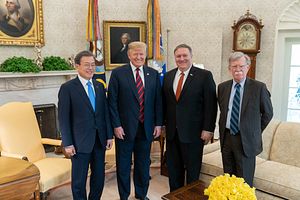The South Korean newspaper Joongang Ilbo reports that Washington will ask for $5 billion annually from Seoul for hosting U.S. military forces in upcoming burden-sharing negotiations. The White House’s demand for South Korea to drastically increase its contributions resumes the paused Trump administration plan to radically change the financial nature of the relationship.
The cost-sharing agreement – officially known as the Special Measures Agreement (SMA) – was first signed in 1991 to evenly split the non-personnel costs of U.S. troops stationed in South Korea. The SMA was renegotiated every five years. While the United States and South Korea did not always see eye-to-eye in previous talks, the two allies were particularly far apart in last year’s negotiations, which by all accounts was driven by President Donald Trump himself.
Washington reportedly asked for Seoul to double their 960 billion won ($860 million) annual contribution – despite this being about 10 percent shy of what South Korea should have been spending based on the U.S. military’s own accounting – to be revisited every year. The December 31, 2018, deadline elapsed without a deal. With pressure mounting in the leadup to the Hanoi summit between Trump and North Korean leader Kim Jong Un this February, both sides settled for what amounted to a stop-gap measure. Seoul agreed to an 8.2 percent increase – above what officials said they were willing to pay but well below Washington’s 16 percent ultimatum – and to revisit talks each year.
Though a deal was reached, Trump gave every indication that his same approach would carry over into the new talks. Recent news indicating Washington will ask Seoul to pay more than five times what was just negotiated in February only confirms this. As challenging as Washington was for Seoul in the previous SMA talks, the scope of this new request and a shifting atmosphere in diplomacy with North Korea stand to make the upcoming negotiations more problematic.
The $5 billion ask reportedly delivered by U.S. National Security Advisor John Bolton last week on his trip to the region far exceeds the administration’s previous opening bid. It is also much higher than what ostensibly would be required under a “Cost Plus 50” policy – a Trump administration proposal that allies pay the full price for hosting U.S. troops and then an additional 50 percent premium. If “cost” is defined as the non-personnel costs, as it has been historically, $5 billion is more than double “Cost Plus 50.” It’s not clear to what extent this number is inflated as a negotiating tactic versus an expanded definition of “cost,” but, either way, asking for over $4 billion more than what Seoul currently spends ($920 million) will prove too untenable of an ask. South Koreans were unhappy with how they were treated in previous talks, though it looks like things could be even more contentious this time around.
Further complicating things, diplomacy with North Korea was on the upswing during previous cost-sharing negotiations, but Pyongyang is now openly demonstrating its displeasure with the lack of a deal and specifically voicing concerns with the U.S.-South Korea alliance. In April, Kim Jong Un gave an end-of-year deadline to Trump to reach a deal. However, negotiations have stalled since both leaders failed to produce an agreement in Hanoi. A third, brief Trump-Kim meeting in June raised hopes for formal working-level discussions to resume, but North Korea has so far not restarted these meetings. Instead, Pyongyang has conducted a series of short-range ballistic missile tests, citing opposition to upcoming U.S.-South Korea joint military drills and South Korea’s acquisition of F-35 stealth jet fighters.
That the North is using the South’s purchases of new U.S. military equipment as a pretext for missile tests is particularly concerning in the context of burden-sharing talks. The Moon government agreed to purchase more U.S. military equipment to help push through the SMA, but if this tactic becomes tied to increased North Korean missile tests – or worse – it could prove to be a major issue for the alliance as they try to pursue diplomacy with Pyongyang.
With SMA negotiations and Kim’s ultimatum for diplomacy sharing an end-of-year deadline, the second half of 2019 will be crucial for the alliance. While there is room to debate how much South Korea contributes to the military relationship, burden-sharing talks should be pursued with the goal of maximizing shared long-term security interests and minimizing any potential fallout – especially as Pyongyang will be looking to exploit gaps between Washington and Seoul. That the Trump administration is not ready to part with its old strategy, however, suggests there is a bumpy several months ahead for the alliance.
Kyle Ferrier is a Fellow and Director of Academic Affairs at the Korea Economic Institute of America (KEI) and a contributor to The Diplomat’s Koreas blog.
































